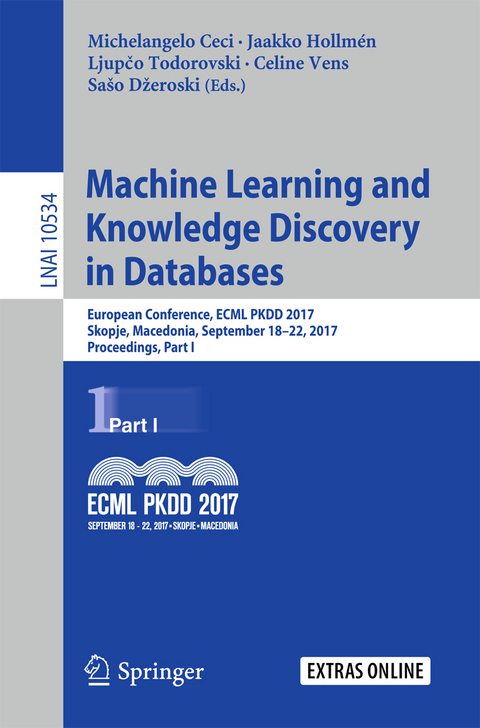
Machine Learning and Knowledge Discovery in Databases
Springer International Publishing (Verlag)
978-3-319-71248-2 (ISBN)
The total of 101 regular papers presented in part I and part II was carefully reviewed and selected from 364 submissions; there are 47 papers in the applied data science, nectar and demo track.
The contributions were organized in topical sections named as follows:
Part I: anomaly detection; computer vision; ensembles and meta learning; feature selection and extraction; kernel methods; learning and optimization, matrix and tensor factorization; networks and graphs; neural networks and deep learning.
Part II: pattern and sequence mining; privacy and security; probabilistic models and methods; recommendation; regression; reinforcement learning; subgroup discovery; time series and streams; transfer and multi-task learning; unsupervised and semisupervised learning.
Part III: applied data science track; nectar track; and demo track.
Anomaly Detection.- Concentration Free Outlier Detection.- Efficient top rank optimization with gradient boosting for supervised anomaly detection.- Robust, Deep and Inductive Anomaly Detection.- Sentiment Informed Cyberbullying Detection in Social Media.- zooRank: Ranking Suspicious Activities in Time-Evolving Tensors.- Computer Vision.- Alternative Semantic Representations for Zero-Shot Human Action Recognition.- Early Active Learning with Pairwise Constraint for Person Re-identification.- Guiding InfoGAN with Semi-Supervision.- Scatteract: Automated extraction of data from scatter plots.- Unsupervised Diverse Colorization via Generative Adversarial Networks.- Ensembles and Meta Learning.- Dynamic Ensemble Selection with Probabilistic Classifier Chains.- Ensemble-Compression: A New Method for Parallel Training of Deep Neural Networks.- Fast and Accurate Density Estimation with Extremely Randomized Cutset Networks.- Feature Selection and Extraction.- Deep Discrete Hashing with Self-supervised Labels.- Including multi-feature interactions and redundancy for feature ranking in mixed datasets.- Non-redundant Spectral Dimensionality Reduction.- Rethinking Unsupervised Feature Selection: From Pseudo Labels to Pseudo Must-links.- SetExpan: Corpus-based Set Expansion via Context Feature Selection and Rank Ensemble.- Kernel Methods.- Bayesian Nonlinear Support Vector Machines for Big Data.- Entropic Trace Estimation for Log Determinants.- Fair Kernel Learning.- GaKCo: a Fast Gapped k-mer string Kernel using Counting.- Graph Enhanced Memory Networks for Sentiment Analysis.- Kernel Sequential Monte Carlo.- Learning Lukasiewicz Logic Fragments by Quadratic Programming.- Nystrom sketching.- Learning and Optimization.- Crossprop: learning representations by stochastic meta-gradient descent in neural networks.- Distributed Stochastic Optimization of the Regularized Risk via Saddle-point Problem.- Speeding up Hyper-parameter Optimization by Extrapolation of Learning Curves using Previous Builds.- Matrix and Tensor Factorization.- Comparative Study of Inference Methods for Bayesian Nonnegative Matrix Factorisation.- Content-Based Social Recommendation with Poisson Matrix Factorization.- C-SALT: Mining Class-Speci_c ALTerations in Boolean Matrix Factorization.- Feature Extraction for Incomplete Data via Low-rank Tucker Decomposition.- Structurally Regularized Non-negative Tensor Factorization for Spatio-temporal Pattern Discoveries.- Networks and Graphs.- Attributed Graph Clustering with Unimodal Normalized Cut.- K-clique-graphs for Dense Subgraph Discovery.- Learning and Scaling Directed Networks via Graph Embedding.- Local Lanczos Spectral Approximation for Membership Identification.- Regularizing Knowledge Graph Embeddings via Equivalence and Inversion Axioms.- Survival Factorization for Topical Cascades on Diffusion Networks.- The network-untangling problem: From interactions to activity timelines.-TransT: Type-based Multiple Embedding Representations forKnowledge Graph Completion.- Neural Networks and Deep Learning.- A network Architecture for Multi-multi Instance Learning.- CON-S2V: A Generic Framework for Incorporating Extra-Sentential Context into Sen2Vec.- Deep Over-sampling Framework for Classifying Imbalanced Data.- FCNNs: Fourier Convolutional Neural Networks.- Joint User Modeling across Aligned Heterogeneous Sites using Neural Networks.- Sequence Generation with Target Attention.- Wikipedia Vandal Early Detection: from User Behavior to User Embedding.
| Erscheinungsdatum | 24.01.2018 |
|---|---|
| Reihe/Serie | Lecture Notes in Artificial Intelligence | Lecture Notes in Computer Science |
| Zusatzinfo | LXIII, 852 p. 245 illus. |
| Verlagsort | Cham |
| Sprache | englisch |
| Maße | 155 x 235 mm |
| Gewicht | 1356 g |
| Themenwelt | Informatik ► Datenbanken ► Data Warehouse / Data Mining |
| Schlagworte | Anomaly Detection • Applications • Artificial Intelligence • Bayesian networks • classification • clustering algorithms • Computer Science • conference proceedings • Data Mining • Data Security • Data Stream • Image Processing • Informatics • Kernel Method • learning algorithm • machine learning • Neural networks • Recommender Systems • Reinforcement Learning • Research • Signal Processing • Social Networking • supervised learning • Support Vector Machines (SVM) • World Wide Web |
| ISBN-10 | 3-319-71248-9 / 3319712489 |
| ISBN-13 | 978-3-319-71248-2 / 9783319712482 |
| Zustand | Neuware |
| Haben Sie eine Frage zum Produkt? |
aus dem Bereich


